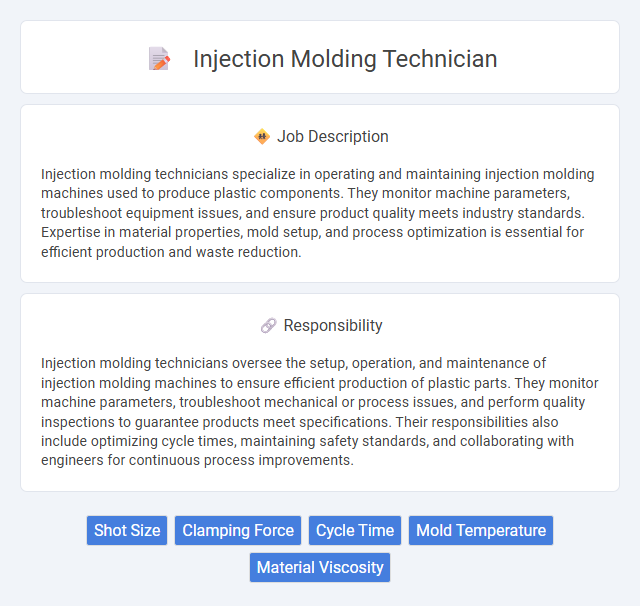
Injection molding technicians specialize in operating and maintaining injection molding machines used to produce plastic components. They monitor machine parameters, troubleshoot equipment issues, and ensure product quality meets industry standards. Expertise in material properties, mold setup, and process optimization is essential for efficient production and waste reduction.
Individuals with strong attention to detail and mechanical aptitude are likely to be well-suited for an injection molding technician role. Those comfortable working in temperature-controlled environments and handling repetitive tasks may have a higher probability of success in this position. Candidates who possess problem-solving skills and can work efficiently under pressure might find this job more compatible with their strengths.
Qualification
Injection molding technicians require a strong understanding of plastic materials, mold design, and machine operation, typically supported by a technical diploma or associate degree in manufacturing technology or plastics engineering. Proficiency in interpreting technical drawings, conducting quality inspections, and troubleshooting equipment is essential. Certifications such as the Plastics Technology Certificate or Six Sigma can enhance qualifications and career advancement.
Responsibility
Injection molding technicians oversee the setup, operation, and maintenance of injection molding machines to ensure efficient production of plastic parts. They monitor machine parameters, troubleshoot mechanical or process issues, and perform quality inspections to guarantee products meet specifications. Their responsibilities also include optimizing cycle times, maintaining safety standards, and collaborating with engineers for continuous process improvements.
Benefit
Injection molding technicians likely experience benefits such as competitive salaries and opportunities for career advancement due to the technical skills required. Job security may be probable given the consistent demand for injection molded products in various industries. Health benefits, retirement plans, and ongoing training opportunities might also be common in this profession, enhancing overall employee satisfaction.
Challenge
Injection molding technician roles likely involve significant technical challenges such as troubleshooting complex machinery and optimizing processing parameters to reduce defects. The probability of encountering issues related to material inconsistencies or machine malfunctions may require strong problem-solving skills and adaptability. Continuous learning and staying updated with evolving technologies are often essential to overcome these obstacles effectively.
Career Advancement
Injection molding technicians gain expertise in operating and maintaining plastic molding machines, enabling them to specialize in process optimization and quality control. Mastery of CAD software and understanding of polymer science expand opportunities toward roles such as mold design engineer or manufacturing supervisor. Pursuing certifications in Six Sigma or lean manufacturing further accelerates career progression within advanced manufacturing settings.
Key Terms
Shot Size
Injection molding technicians expertly manage shot size, the critical volume of molten plastic injected into molds to form precise parts. Accurate shot size control ensures optimal material usage, reduces waste, and maintains consistent product quality throughout production runs. Skilled technicians calibrate machines to achieve exact shot measurements, directly impacting cycle time and minimizing defects.
Clamping Force
Injection molding technicians ensure the proper setup and operation of molding machines, focusing on clamping force to secure molds during injection and prevent defects. Precise clamping force balances are critical to avoid mold flash, ensure part quality, and minimize machine wear. Mastery of clamping force parameters directly impacts cycle time efficiency and overall production consistency.
Cycle Time
Injection molding technicians optimize cycle time to enhance production efficiency in manufacturing plastic parts. They monitor machine parameters, including temperature, pressure, and cooling time, to reduce cycle duration without compromising product quality. Precise cycle time management leads to increased throughput and cost-effective operations.
Mold Temperature
Mold temperature control is critical for an Injection Molding Technician to ensure consistent part quality and reduce cycle times. Precise regulation of mold temperature enhances material flow, minimizes defects such as warping and sink marks, and improves overall production efficiency. Advanced temperature monitoring systems and maintenance of heating elements are essential skills for optimizing injection molding processes.
Material Viscosity
Injection molding technicians expertly control material viscosity to ensure optimal flow and proper filling of molds, directly impacting product quality and cycle time. Precise adjustments in temperature and pressure help maintain the desired viscosity, preventing defects such as warping or incomplete filling. Mastery of rheological properties is crucial for producing consistent, high-strength plastic components in diverse manufacturing environments.
 kuljobs.com
kuljobs.com